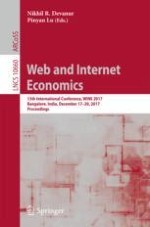2017 | OriginalPaper | Buchkapitel
Sequential Deliberation for Social Choice
verfasst von : Brandon Fain, Ashish Goel, Kamesh Munagala, Sukolsak Sakshuwong
Erschienen in: Web and Internet Economics
Aktivieren Sie unsere intelligente Suche, um passende Fachinhalte oder Patente zu finden.
Wählen Sie Textabschnitte aus um mit Künstlicher Intelligenz passenden Patente zu finden. powered by
Markieren Sie Textabschnitte, um KI-gestützt weitere passende Inhalte zu finden. powered by
